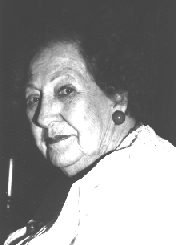Page 63
[Begin Tape 1, Side A]
Knight: Today I'd like to talk to you more about your time in Washington, D.C., and your point of view about journalism in your own career as you look back on it. You have written a lot about the substance of what you've done. I read your book that was first My Eight Presidents and then I heard you were writing about My Nine Presidents, and I hope to read the latest manuscript, My Ten Presidents. I want to talk some more about the "how" and "why," rather than the "what" today.
Describe to me your feelings and your experience of the very first presidential press conference that you ever attended.
McClendon: I was quite scared. I didn't ask any questions, and I figured that if I did, I would show my ignorance, because I'd just come up from being in the army and I had not kept up with current events as much as I should have, and I didn't know as much about the war, really, as one might think. So I kept quiet, but I was watching the other people, and they were very distinguished, very wonderful, brilliant news correspondents, people in history, really. They were writing on each other's backs, the room was so crowded, and you couldn't see very well.
I had to squinch down and run around to try to even see the desk where [Franklin Delano] Roosevelt was. Then I saw him, with his hands shaking like this, and I saw him hide his hands under the desk, because he didn't want people to realize how ill he was. But it was quite an experience. I was overwhelmed with the majesty of the moment and with the brilliance of the reporters around me.
Knight: You never asked FDR any questions?
McClendon: No, indeed. I wasn't going to show my ignorance, and I was kind of scared of him, too. I knew he was very much of a dictator, and I knew he was always right, but I knew that he had given one man, Drew Pearson, a very fine reporter, a great columnist, he had given him a dunce cap and told him to go in the corner and stand as a dunce. Then he'd given another man, John O'Donnell of the New York Daily News, he gave him an Iron Cross from Germany because what he had written, he said, had not helped the war effort.
Knight: I also read that you saw the women reporters who had distinguished themselves because they developed a certain personality and style, and that you made a conscious decision to do that.
McClendon: Yes, I did.
Knight: How did that transformation take place?
McClendon: I watched Esther Tufty, and she had everybody calling her "the Duchess." She was tall and statuesque and beautiful, long braids. She had established this idea that she was very

